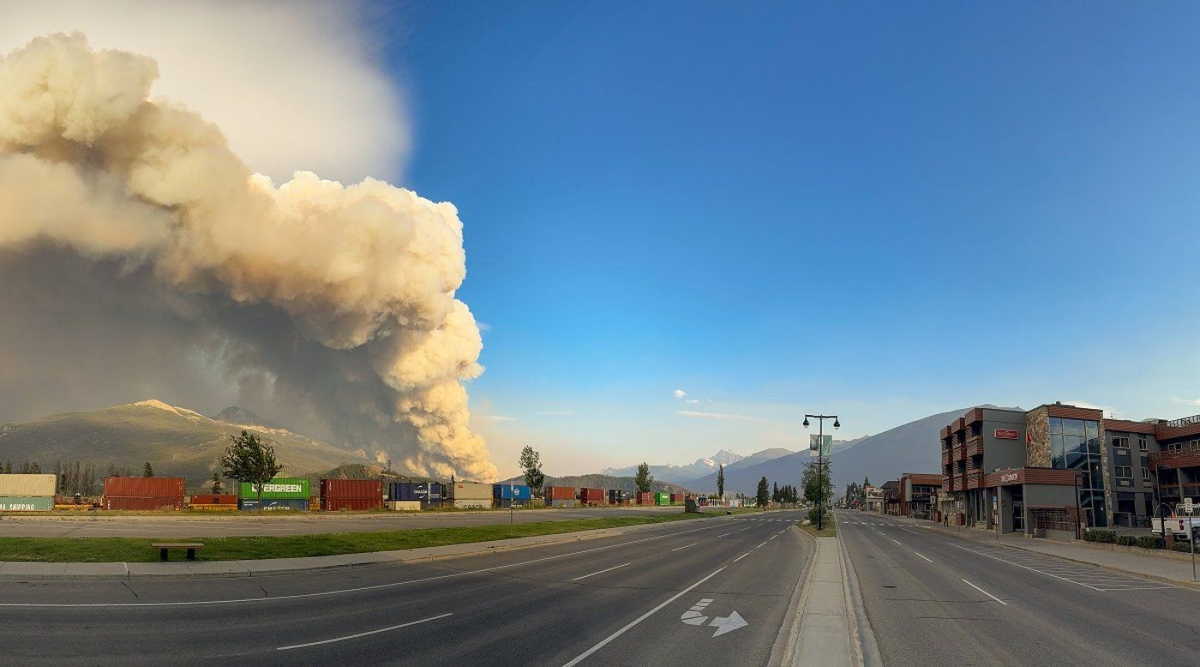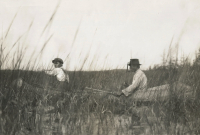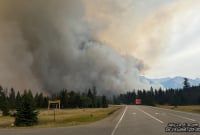Support strong Canadian climate journalism for 2025
Jasper has me stumbling for words. “Grief” doesn’t capture the feeling. That seems too precise. There isn’t even anger, not yet anyway. Just a bone-deep sadness.
I don’t know why some catastrophes hit deeper than others. It’s not the first town incinerated in this new, fossil-fuelled, Pyrocene. Not in Canada. Certainly not around the world. “Another town burned,” reads one news post, almost humdrum, passing across the screen. It wasn’t fatal for people, didn’t kill the most wildlife. More than half the townsite may have survived.
But we love Jasper. It may not be peak Instagram, like Banff, but those silver slopes are somehow quintessentially Canada. Always top of the list for me as a young treeplanter when there were enough days off between contracts for a night or two in the Rockies.
An achingly beautiful and soul-stretching part of our planet. Still, the depth of sadness defies explanation. Very few people weeping openly on social media have any ongoing connection to the area. I’m reminded of a friend who once came out with one of those brilliant blurts: “It’s like art or husbands,” she said. “We don’t choose what we love.”
I’ve never even been inside the iconic Maligne Lodge, but I suspect that shot will haunt me, and many of us, for years.
Somehow I can’t even summon anger that the firecrews in Jasper were diverted to protect the Trans Mountain pipeline — gotta keep the fossils flowing and stoke the flames. Just a deadened sadness.
Ditto for the myopic cuts to Alberta’s firefighting services and the bureaucratic knots of municipal, provincial and federal emergency response.
It’s not the time, we’re scolded, to mention that Alberta is hitting new records for fossil fuel production. That would be unseemly. That Ontario is expanding its gas network. That BC is charging ahead on LNG. That our taxes are bankrolling brand-new fossil infrastructure, at this very moment, and the richest countries in the world are leading the opening of new oil and gas fields. The reckoning is decades late and still too soon.
The wall of flame that raced into Jasper was both shocking and familiar. "Fire crews were witnessing 300- to 400-foot flames,” said James Eastham, a Parks Canada wildfire information officer. “A fully involved, continuous crown fire and a fire spread rate of approximately 15 metres per minute."
It was one of two fires threatening the town, one from the north and the one that raged into Jasper from the south. Residents and visitors had to evacuate on a moment’s notice in the dark of Monday night, following instructions to head west into B.C. “A day later they were directed to loop back to Alberta as British Columbia, dealing with its own fires, did not have the capacity to assist.”
Almost 1,000 active fires are burning across Canada, 423 of them in B.C. Three weeks ago, fire season seemed relatively subdued, a green-hued Level 2 according to the Canadian Interagency Forest Fire Centre. The year-to-date stats are still well behind last year’s horrendous summer but the situation report has exploded, especially in the west.
This sense of bone-deep sadness must be only partly about Jasper itself. Awful as it is, the loss is compounded by a creeping understanding “that what was can no longer be,” as LaUra Schmidt described for us a few weeks ago (Grief. What is it good for?).
What was no longer is. We all know the names. Santa Rosa: 2,800 homes torched. The Napa and Sonoma fires: Forty-three dead and 5,700 buildings burned. The next year, the Camp Fire: 81 dead, Paradise gone. Then, Lytton, B.C., the Marshall Fire in Colorado. Last year, Lahaina, 100 dead. Enterprise, Northwest Territories… What was can no longer be.
And what’s coming? The sadness for Jasper is twinned with foreboding. A shapeless fear that Schmidt described as “anticipatory grief.” Fires will keep getting worse until we eliminate climate pollution. The laws of physics are unmoved by the excuses of lobbyists and lawmakers.
“This is a red alert type of situation,” says Blair Feltmate, director of the Intact Centre on Climate Adaptation at the University of Waterloo. “Not only is there an enormously high degree of risk, we’re realizing that risk is only going to increase. As bad as things are now with floods, the wildfires and the extreme heat events, it’s going to get worse. Climate change is irreversible.”
There’s an almost fractal parallel between Jasper and the incineration of Lytton. Three years ago, on June 27, Lytton set a new Canadian heat record. That record fell on June 28. It was shattered on June 29, with a scorching 49.6°C. On June 30, not even concrete and steel survived.
The ashes of Jasper come during a planetary temperature streak. Last Sunday was the hottest day on Earth in recorded history, probably for well over 100,000 years.
The record didn’t last 24 hours. "This has been, I mean, probably the shortest-lived record ever," said Carlo Buontempo, director of the European climate service Copernicus.
The scientists are still checking and triple-checking but as best we can tell, Jasper burned following the three hottest days on global record.
Buontempo doesn’t predict the new record will last very long either, because of the "big driver" — greenhouse gas emissions, from the burning of coal, oil and natural gas.
“What is truly staggering is how large the difference is between the temperature of the last 13 months and the previous temperature records,” he says.
“We are now in truly uncharted territory,” says Buontempo.
It’s tragic that we have ended up in this territory. What happened to Jasper is certainly tragic. But not truly a tragedy. It was not predestined. Lawmakers, corporate leaders, everyone in power has had abundant warning for decades. And we still have agency. If anything, it’s a scandal. And, above all, a great sadness.






Comments
Well written and a clarion call to open our eyes, hearts and minds.
It's wildly ironic but says it all.
Danielle Smith's surprising expression of genuine emotion on air about her PERSONAL association with iconic Jasper naturally inspired some empathy but although ALL media glommed onto this gem immediately, even BBC NEWS, NO ONE pointed out that yeah, no shit, that's how most of us feel ABOUT CLIMATE CHANGE you science-denying idiot.
But instead of taking the opportunity to frame the whole climate grief narrative, media headed for the weeds as usual, focusing on everyone ELSE'S personal associations and experience with Jasper, not the stunning hypocrisy and breathtaking stupidity of the fact that Smith and her United Clown Posse stand proudly AGAINST thousands of scientists and FOR big oil forever.
So Ian Hanomansing didn't say this in his interview with her of course, just asked if she was rethinking any of her policies generally. She would have bristled hugely of course, but he still should have pushed her since her and her ilk have nothing but contempt for our public broadcaster on principle anyway, like all things public, including "public health" FFS.
That theory on CEO's being disproportionately psychopaths? Seems to be fully vindicated now, as does the saying that "nice guys finish last."
The ultimate irony is that apparently we're all doomed because of both a pathological aversion to conflict AND an abiding, perverse fascination with "dark energy" in whatever form it appears.
BINGO, Tris! My sentiments exactly. I sort of stoked a major discussion on the "Friends of the CBC" FB page recently by suggesting Ian H. missed a golden opportunity to "hold power to account" by not asking Premier Smith if she felt culpable in the Jasper disaster given her policies of solid support of big oil and her determination to halt or delay alternative energy projects. Several commenters felt such a question would ruffle too many feathers and open up more criticism form the right that the CBC was biased. I also got lots of support, too, for which I'm thankful. Tris, may I place part of your comment, above (under your name, of course) on that page? If you'd like me to add a detail or 2 as to who you are, that would be nice, too! (If you are a CBC alum by any chance, you could consider placing it there yourself.) Not sure if N.O. allows commenters to communicate with each other in this space. If not, you could just email me at [email protected]
Thanks!